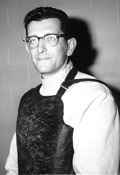By Irving De Koff
What is the best system of fencing? Obviously, the French school is the best. No! The Italian system is by far the most superior school of fencing in the world. Whoa, sez my friend, “without a doubt the Hungarians have shown… ad infinatum. This is, or at least has been the story of which system is the best.
The answer here is for your information and it is preferred free of charge. My system is by far the best! For me it is the best, not necessarily for you. My system is the Bastard System, which polity might, perforce, call Eclectic. It is made up of the following ingredients; quite a bit of French picked up while watching Michel Alaux; some Alec Hern from watching Axelrod, Essman, and Wong, a generous sprinkling of Anthony Greco’s Italian school; getting hit by Dolly Funke’s prime parry-riposte, a large portion of Joe Valarde’s Pragmatic school of fencing; and finally, what my own fencers taught me. Add something you call experience, observation, and experiment and you have my Ecletic System.
The one feature in my system which makes it unusually good is that it has built-in self regulators. If I see something that will work better than what I am doing at the present time, I make the change. Making the change is not always easy, espacialy when I have built a system around an idea that is no longer tenable. Without self-regulation the system would fail, and I don’t care what system you espouse, the same thing holds for you too.
If I noticed one thing worth noticing at the last Olympic Games, is was that there is a great similarity of style ands technique among all nations. The qualitative differences are due to experience and methods of training.
It is this writers hope that some day soon, somebody will take cognizance of this fact and establish a national school of fencing. I do not mean an actual school but a system of fencing which will be accepted as a standard for most of us to use as a guide. Remember, I said as a guide, not as a garrot which will stifle experimentation and imagination, but as a guide.
Until the NFCAA writes its own book, why not accept one of the existing books, such as Crosnier, Deladrier of Castello, or others not mentioned here, as the national standard text. We could then recommend its use and study and possible revision to meet our present needs. While the best answer is our own book, perhaps recognition of another book or two, would stimulate the Association to action on this matter.

